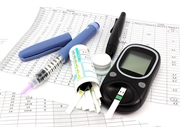As Diabetes Costs Soar, Many Turn to Black Market for Help
By Serena GordonHealthDay Reporter

MONDAY, Dec. 9, 2019 (HealthDay News) -- Skyrocketing prices and insurance limits are driving many people with diabetes to seek medications and supplies from an underground supply chain, a new study found.
"The cost of insulin, which is required in type 1 diabetes and a subset of type 2 diabetes, has increased substantially over the last decade. As the price of insulin rises and insurance premiums and deductibles go up, too, the situation has become untenable," said the study's lead author, Michelle Litchman. She is a nurse practitioner and assistant professor at the University of Utah College of Nursing, in Salt Lake City.
Litchman explained that if people who need insulin ration it or stop using it, they can end up in the hospital and even risk dying.
"People with diabetes want to stay healthy and because of that, they're going to this extreme of seeking out insulin and diabetes supplies through nontraditional sources," she added.
Litchman noted that people seem to be aware that there are risks involved in getting medication and supplies from family, friends or online sources. But there's also a risk in not taking medications like insulin, which are needed to stay alive.
Cynthia Rice, chief mission strategy officer for JDRF (formerly the Juvenile Diabetes Research Foundation), said, "Type 1 diabetes is a disease where you need insulin multiple times a day, every day. It's hard to fathom what it would be like not to have the insulin you need."
Yet it's a situation too many face. The average cost of insulin in the United States nearly tripled between 2002 and 2013, according to the American Diabetes Association.
"We need policy change. Congress and the companies that make insulin and health plans all need to treat insulin like the lifesaving drug it is," Rice said.
Litchman and her colleagues requested that people involved in a non-traditional diabetes black market answer a survey. Nearly 160 people responded. Most were white females in their 40s. Most were college-educated. Income levels varied.
About 100 had diabetes. Forty were spouses or parents of someone with diabetes. The remainder didn't identify their connection to diabetes.
Almost 57% of responders had donated insulin or other supplies to other people. About 35% had received supplies from someone else. Almost half said they had either traded or borrowed supplies. Just 15% said they purchased supplies from a non-traditional source. (Some people answered yes in more than one category.)
These transactions aren't without risk, particularly for insulin. Insulin can only be used for about a month when it's not refrigerated. Also, if it gets too hot or too cold it may not work properly. Diabetes test strips or pump supplies may be out of date and ineffective, or internal batteries may have died. Only three people in the study reported issues, however.
Diabetes-related financial stress led the list of reasons why people sought out the diabetes black market. Lack of accessibility, particularly due to bureaucracy, was also a big factor in these underground transactions.
For example, one survey respondent said, "Our insurance has not provided insulin for the past 6 months even with doctor writing for prior authorization and appealing. Finally, he wrote [a prescription] for a new insulin, and insurance approved it … but it cost $6,600… It's still being held hostage at the pharmacy. So I borrowed some from a stranger."
Why do people choose to donate their supplies to others?
One person said, "I accidentally received a double shipment of my insulin, and an online friend was struggling and awaiting Medicaid approval. They had been rationing for months. I have plenty, they had none. I cannot let that slide."
Another wrote, "My coworker avoided going to the hospital because I donated insulin to them."
Litchman said there was an overarching thread running through the comments: "The traditional health care system isn't meeting the needs of people with diabetes."
She said that diabetes isn't the only example where this type of trading may occur. Other potentially lifesaving medications that may be shared include asthma inhalers, epinephrine injections (EpiPens) and the opioid overdose drug Narcan.
Andrew Powaleny is a spokesperson for PhRMA, a drug trade industry association. He said, "Ensuring patients can get the medicines they need is critically important." He said patient-assistance programs are available for those struggling to afford medications. Powaleny also said PhRMA supports sharing rebates and discounts with the consumer at the pharmacy counter, out-of-pocket price caps, predictable monthly out-of-pocket costs and lowering coinsurance costs.
The study findings were published online Dec. 4 in the Journal of Diabetes Science and Technology.
More information
If you're having trouble affording insulin, check out this resource page from JDRF, that includes a link that allows you to search for a community health center near you that offers medical care and medications on a sliding scale.

The news stories provided in Health News and our Health-E News Newsletter are a service of the nationally syndicated HealthDay® news and information company. Stories refer to national trends and breaking health news, and are not necessarily indicative of or always supported by our facility and providers. This information is provided for informational and educational purposes only, and is not intended to be a substitute for medical advice, diagnosis, or treatment.

